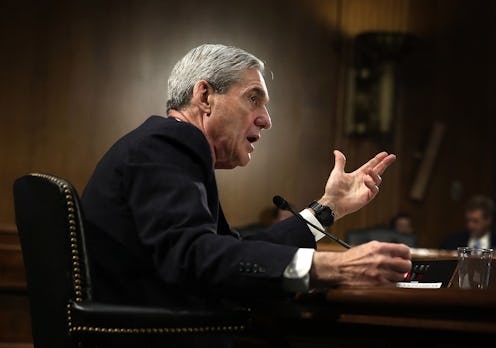News
Here's The Proof Robert Mueller Won't Be Swayed By Trump

In response to calls for a special prosecutor for the FBI's Russia investigation, Deputy Attorney General Rod Rosenstein named a former FBI director as special counsel. Robert Mueller has a long record at the FBI, having served for 12 years — more than the typical 10-year term — under both Republican and Democratic presidents.
Mueller was unanimously confirmed by the Senate and began his position as FBI director just days before the Sept. 11 attacks in 2001. He stayed in the job until 2013, serving for about four years under President Obama until James Comey was appointed. In fact, Mueller and Comey worked together — Comey served as deputy attorney general from 2003 to 2005, when Mueller was the FBI director.
Mueller is widely respected by both sides of the aisle and is seen as non-partisan and non-discriminating when it comes to investigations, as evidenced by the fact that he was appointed by George W. Bush and was asked to stay on by Obama. Before he became the FBI director, Mueller worked as a United States attorney in both California and Massachusetts and also worked a stint at the Department of Justice. Of course, more than his background, it's his long record at the FBI that speaks for itself.
Because he was only FBI director for one week before the Sept. 11 attacks, a fair amount of Mueller's tenure was focused on terrorist threats. As former Attorney General Eric Holder said when Obama asked Mueller to extend his term, "The United States faces ongoing threats from terrorists intent on attacking us both at home and abroad, and it is crucial that the FBI have sustained, strong leadership to confront that threat. There is no better person for that job than Bob Mueller."
As an in-depth Washingtonian profile of Mueller from 2008 details, Sept. 11 marked a turning point for the FBI as it moved away from a focus on prosecution to a focus on prevention. Mueller was in charge of a team that was investigating as many terrorist threats as they could look into.
Mueller later led investigations during the anthrax scares, when biological terrorist attacks were occurring through the simple act of sending mail. The FBI's handling of the investigation was highly criticized for the time that was spent on a suspect who ultimately was determined to not have been involved and for the way it was resolved.
Mueller was also director when torture used as "enhanced" interrogation was in the national spotlight, specifically in the case of Abu Zubaydah, a Saudi Arabian suspected of being involved with al Qaeda, who was waterboarded 83 times. Bush defended the use of torture as a way to get necessary information, but Mueller ultimately declared that the FBI would not be involved with CIA interrogations that used "extreme techniques," Vanity Fair reported.
But along with the fight against al Qaeda, Mueller also once warned in 2010 that domestic terrorism was just as serious a problem. Citing attacks like the Oklahoma City bombing, Mueller warned that "home-grown and lone-wolf extremists" — from right-wing extremists and anti-government militias to American-born Muslim terrorists — were a serious threat.
Of course, though, one of the moments Mueller is best known for is the time in 2004 when he and Comey joined forces and declared that they would resign if the White House ignored the Department of Justice's warning that the National Security Agency's attempt to implement a mass wiretapping program without a warrant was illegal.
If his record of standing for what he believes is right — to the point where he might resign over it — is any indication, Mueller truly is the best person for the job, as many are saying. He stood up to Bush on more than one occasion, so rest assured he'll stand up to Trump if it comes down to it.